Green screens
When planning a new garden there is nothing quite as urgent as backyard privacy.
Whether you need to screen the neighbours or take the edge off a chilling wind, a leafy wall of native foliage is a very attractive solution. There are beautiful natives to suit every style of garden – or gardener.
For the impatient gardener
It’s amazing how fast some natives will grow but a quickly built screen of timber, tin or brush sticks can turn your fishbowl into a secluded sanctuary in the space of a weekend. A temporary screen is a good option while you wait for trees to grow.
Exactly how fast they grow depends on the variety, the soil, and the climate. To achieve the fastest possible growth rate, plant in well-prepared soil with compost and controlled-release fertiliser, mulch after planting, use wind cloth to shelter young shrubs and water during dry periods.
However, take care not to overdo feeding or watering. Native plants don’t like soil that is too wet, and they can be sensitive to excessive fertiliser. Bear in mind too, that the fastest growing varieties require the most frequent trimming. Patience is a virtue rewarded with reduced maintenance.
A climbing plant will soften a wall or fence without sacrificing too much ground space. Spectacular Clematis paniculata (NZ Puawhanganga), is a fast growing evergreen with masses of white flowers in spring. In a frost-free climate, the shiny foliage of Tecomanthe speciosa makes a handsome cover for a strongly built structure. This native of the Three Kings Islands has stunning soft green trumpet flowers, which tuis visit for nectar.
For the tidy gardener
Classy clipped hedges offer year-round structure, as well as shelter and privacy. The finest formal hedges are created from evergreens with small close-packed leaves, which is why Corokia is so popular. Totara also makes beautiful formal hedge and deserves to be planted more often. Big leaf shrubs, such as glossy Griselinia make a nice formal hedge too, but slicing them with hedge sheers can make them look butchered. This can be avoided by trimming with secateurs, a much more labour intensive job.
Most hedge plants have a wide range of heights at which they can be kept with regular trimming. Above all, choose a suitable plant for your soil and climate.
For the casual gardener
If constant clipping isn’t for you, plant an informal hedge. Occasional trimming of the top growth may be necessary to restrict the height and maintain bushy growth close to the ground, but choose a growth habit that approximates your desired height range.
Many natives provide the added bonus of flowers or berries. Corokias and coprosmas, for example, provide colourful berries. The spring flowers of Pittosporum go largely unnoticed until they emit their lovely evening fragrance. Pohutukawa makes a handsome tall flowering hedge.
If you have space to go wider than single file, consider a mixed native planting – your own mini bush and a perfect nesting site for birds! Native birds love native plants.
For the windblown gardener
A thick living screen is the most effective buffer to wind, dust and salt spray, but the plants we choose to protect us and our gardens need to be tough themselves. Shelter is often the first thing planted in a coastal garden, and coastal natives, like Olearia, karo (Pittosporum crassifolium) and pohutukawa are among the best. Established shelter trees will give protection for up to ten times their height.
Design tips
- Not just for property boundaries, hedges make effective internal walls too. Screen off parts of the garden so that all is not revealed in one sweeping glance, and it will be all the more enticing, and may appear bigger than it is!
- If the permitted boundary fence isn’t tall enough, create more privacy by planting a screen closer to your sitting area.
- A hedge with smaller leaves will make a compact garden feel more spacious than one with large leaves.
- The bronze and silver tones in our various Corokia cultivars provide beautiful subtle contrast in a mainly green garden.
Five fabulous native hedges
Corokia
With fine foliage perfect for clipping, corokias rate among the very best low to medium hedges. There is a range of beautiful cultivars including bright apple green ‘Genty’s Green’, ‘Frosted Chocolate’, ‘Bronze King’ and ‘Silver Ghost’. Corokias are frost hardy but well drained soil is essential.
Pittosporum
The various forms of Pittosporum tenuifolium (kohuhu) are favourites for screen planting in town gardens. ‘Mountain Green’, a selected form of Kohuhu has bright, lettuce- green foliage and compact growth. Another top performer, ‘Tandarra gold’ has gold-green leaves with dark stems. Taller P. eugenioides, (tarata or lemonwood) has pale green leaves with a distinct lemon fragrance when crushed. Most pittosporums are frost hardy. They need well-drained soil. P. crassifolium (karo) is the one to plant on windy coastal sites.
Griselinia
Glossy bright green Griselinia littoralis is a hugely popular hedge plant with wavy, bright green leathery leaves. It can be grown at any height and is excellent in coastal gardens, but intolerant of prolonged wet feet and is only moderately frost hardy. Best pruned with secateurs.
Totara
Beautiful Podocarpus totara is a large slow growing tree, but with regular trimming it can be kept to almost any size and, although young plants are slow to thicken, it makes a stunning long-term hedge. The choice of olive green or gold has now been expanded with the arrival of ‘Matapouri Blue’, which has stunning blue-gray foliage. Totara is frost hardy and wind tolerant, although not ideal for coastal conditions.
Pohutukawa
We know and love it best as a huge spreading tree, but the NZ Christmas tree will retain a shrubby habit for many years after planting and makes an attractive hedge, a godsend in coastal gardens. Although trimming will reduce flowering, pohutukawa responds to trimming with fresh bushy growth. Alternatively, include it in a mixed shelter planting for a splash of Christmas colour. Nurserymen have developed a range of cultivars from our beloved Metrosideros excelsa, selected for their distinctive growth habits and flowering excellence. ‘Vibrance’ is one of the showiest in bloom and makes a thick bushy hedge. The Kermadec pohutukawa and its gold variegated form, M. kermadecensis ‘Variegata’ also make very good hedges for warmer climates.

1-Nov-2011
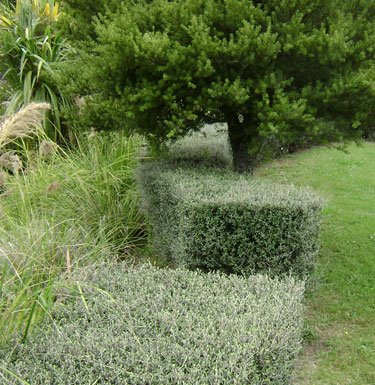
Corokia Silver Ghost hedge
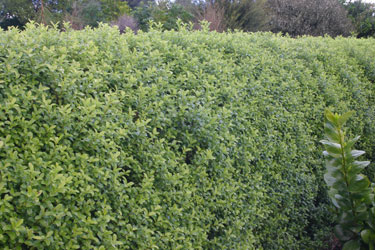
Pittosporum tenufolium hedge
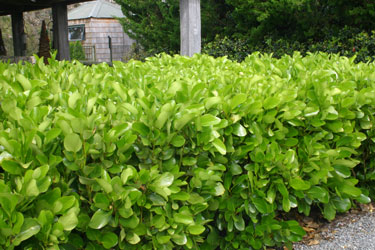
Griselinea littoralis hedge
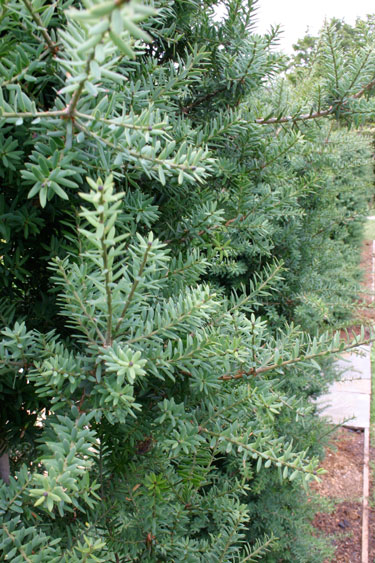
Totara Matapouri Blue
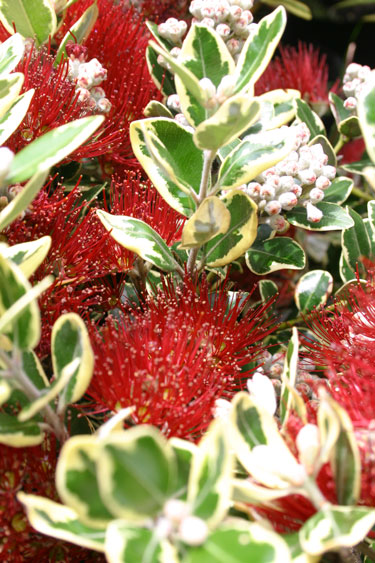
Variegated pohutukawa

